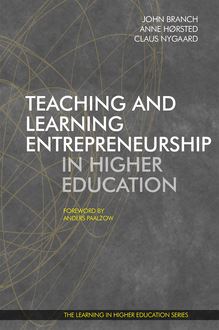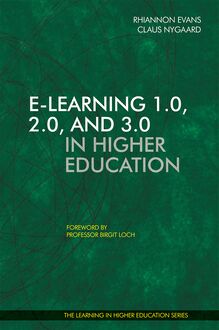-
 Univers
Univers
-
 Ebooks
Ebooks
-
 Livres audio
Livres audio
-
 Presse
Presse
-
 Podcasts
Podcasts
-
 BD
BD
-
 Documents
Documents
-
- Cours
- Révisions
- Ressources pédagogiques
- Sciences de l’éducation
- Manuels scolaires
- Langues
- Travaux de classe
- Annales de BEP
- Etudes supérieures
- Maternelle et primaire
- Fiches de lecture
- Orientation scolaire
- Méthodologie
- Corrigés de devoir
- Annales d’examens et concours
- Annales du bac
- Annales du brevet
- Rapports de stage
La lecture à portée de main
Découvre YouScribe en t'inscrivant gratuitement
Je m'inscrisTeaching and Learning Entrepreneurship in Higher Education , livre ebook
Découvre YouScribe en t'inscrivant gratuitement
Je m'inscrisEn savoir plus
En savoir plus

Description
For many years, it has been the general view that entrepreneurs are simply born that way – that entrepreneurship is innate and therefore cannot be taught (or learned), and is therefore a subject unsuited to higher education. The logic seemed to follow: an entrepreneur is just naturally an entrepreneur, and studying entrepreneurship, therefore, is a meaningless enterprise. Borrowing Nike’s slogan, entrepreneurs just do it.
But in recent years, a complete reversal of thinking in higher education has occurred. Indeed, entrepreneurs, it is claimed, are made, not born. In other words, entrepreneurship can be learned. Subsequently, institutions of higher education, in most countries around the world, have embraced the teaching and learning of entrepreneurship with fervour, as demonstrated by the growth of entrepreneurship centres, new venture incubators, and business plan competitions on college and university campuses.
Teaching and Learning Entrepreneurship in Higher Education embraces this if to how reversal, by exploring entrepreneurship activities at different universities around the world from three primary perspectives: policy, practice, and mindset. Its twelve chapters demonstrate that there is no ‘one-size-fits-all’ model for teaching and learning entrepreneurship in higher education. Despite their differences, however, the twelve also share a common desire to develop and nurture entrepreneurship, and will inspire anyone with an interest in teaching and learning entrepreneurship in higher education.
Sujets
Informations
| Publié par | Libri Publishing Ltd |
| Date de parution | 30 juin 2017 |
| Nombre de lectures | 0 |
| EAN13 | 9781912969470 |
| Langue | English |
| Poids de l'ouvrage | 15 Mo |
Informations légales : prix de location à la page 0,2650€. Cette information est donnée uniquement à titre indicatif conformément à la législation en vigueur.
Extrait
-
 Univers
Univers
-
 Ebooks
Ebooks
-
 Livres audio
Livres audio
-
 Presse
Presse
-
 Podcasts
Podcasts
-
 BD
BD
-
 Documents
Documents
-
Jeunesse
-
Littérature
-
Ressources professionnelles
-
Santé et bien-être
-
Savoirs
-
Education
-
Loisirs et hobbies
-
Art, musique et cinéma
-
Actualité et débat de société
-
Jeunesse
-
Littérature
-
Ressources professionnelles
-
Santé et bien-être
-
Savoirs
-
Education
-
Loisirs et hobbies
-
Art, musique et cinéma
-
Actualité et débat de société
-
Actualités
-
Lifestyle
-
Presse jeunesse
-
Presse professionnelle
-
Pratique
-
Presse sportive
-
Presse internationale
-
Culture & Médias
-
Action et Aventures
-
Science-fiction et Fantasy
-
Société
-
Jeunesse
-
Littérature
-
Ressources professionnelles
-
Santé et bien-être
-
Savoirs
-
Education
-
Loisirs et hobbies
-
Art, musique et cinéma
-
Actualité et débat de société
- Cours
- Révisions
- Ressources pédagogiques
- Sciences de l’éducation
- Manuels scolaires
- Langues
- Travaux de classe
- Annales de BEP
- Etudes supérieures
- Maternelle et primaire
- Fiches de lecture
- Orientation scolaire
- Méthodologie
- Corrigés de devoir
- Annales d’examens et concours
- Annales du bac
- Annales du brevet
- Rapports de stage


















